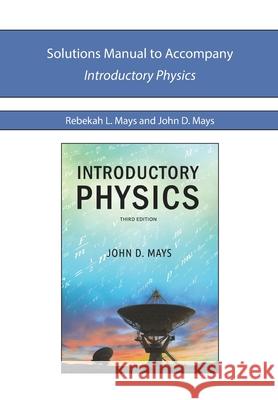Solutions Manual for IP2e » książka
Solutions Manual for IP2e
ISBN-13: 9780997284553 / Angielski / Miękka / 2016 / 90 str.
Steps to solving calculation problems in Introductory Physics, 2nd edition. The Solutions Manual is a useful supplement to students, homeschooling environments, or anyone who would like help with the working out of calculation problems in Introductory Physics. Appropriate for grade-level 9th to 11th grade students, Introductory Physics incorporates math, history, and epistemology alongside the beautiful graphics and lucid text in a modestly-sized volume that students will appreciate. This book was designed for grade-level freshmen, but it is also suitable for physics in the sophomore or junior year. In fact, optional chapters are added for the benefit of schools where physics occurs in 10th or 11th grade and students can move more quickly through the material. Mathematical problems are rigorous and challenging, but only assume that students are taking Algebra I concurrently. The text is not suitable for an upper-level vector/trig physics course; for a vector-based text, see our book Physics: Modeling Nature. A common question we hear goes something like, "Is this text a real physics course?" Understandably, people wonder if a freshman level physics course will "count," will it be a full credit, will students be short-changed. The answer is, Yes, this is a full physics course that counts a full science credit. In fact, if our mastery-learning paradigm is followed, students will know physics better at the end of the course than with any other method.
Steps to solving calculation problems in Introductory Physics, 2nd edition.The Solutions Manual is a useful supplement to students, homeschooling environments, or anyone who would like help with the working out of calculation problems in Introductory Physics.Appropriate for grade-level 9th to 11th grade students, Introductory Physics incorporates math, history, and epistemology alongside the beautiful graphics and lucid text in a modestly-sized volume that students will appreciate. This book was designed for grade-level freshmen, but it is also suitable for physics in the sophomore or junior year. In fact, optional chapters are added for the benefit of schools where physics occurs in 10th or 11th grade and students can move more quickly through the material. Mathematical problems are rigorous and challenging, but only assume that students are taking Algebra I concurrently. The text is not suitable for an upper-level vector/trig physics course; for a vector-based text, see our book Physics: Modeling Nature.A common question we hear goes something like, “Is this text a real physics course?” Understandably, people wonder if a freshman level physics course will “count,” will it be a full credit, will students be short-changed. The answer is, Yes, this is a full physics course that counts a full science credit. In fact, if our mastery-learning paradigm is followed, students will know physics better at the end of the course than with any other method.











